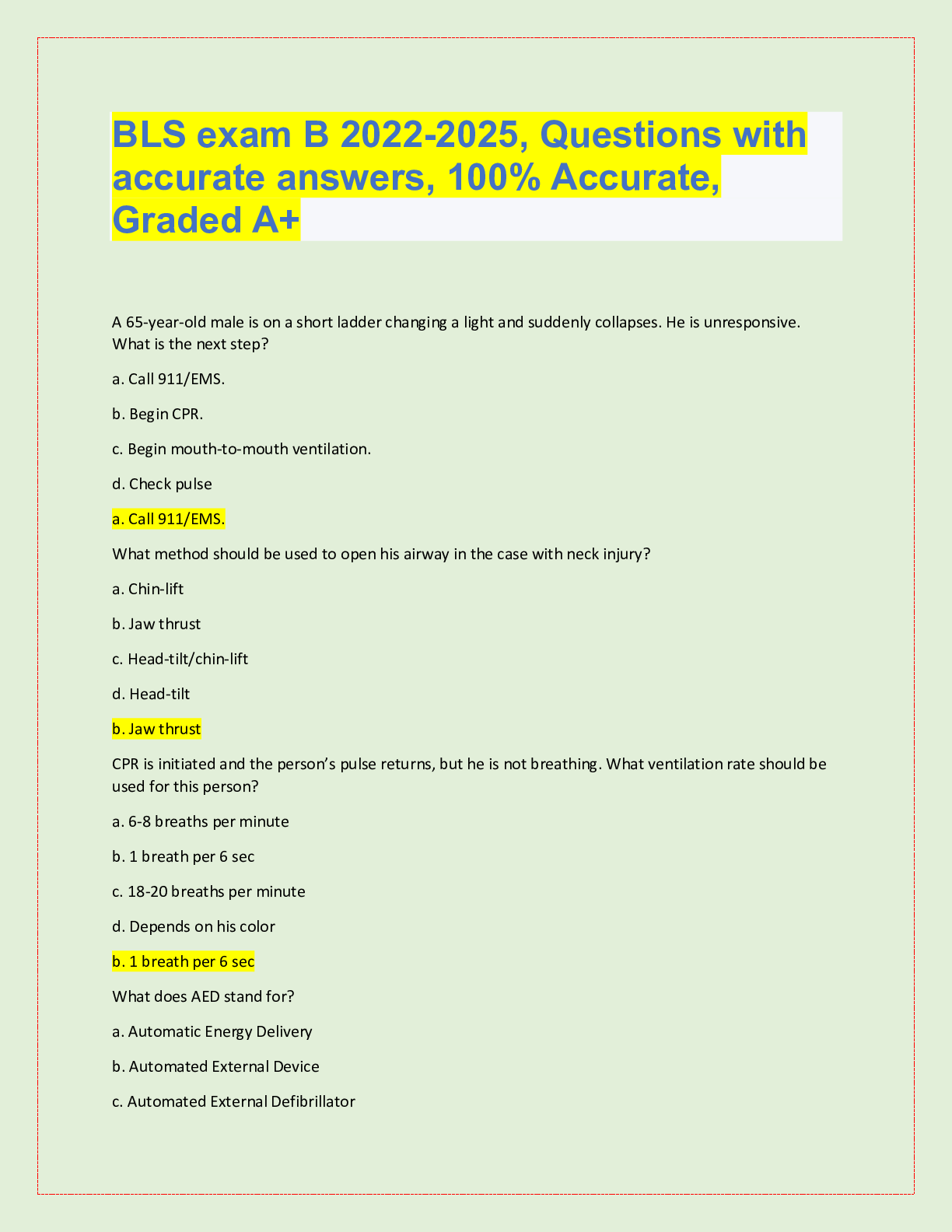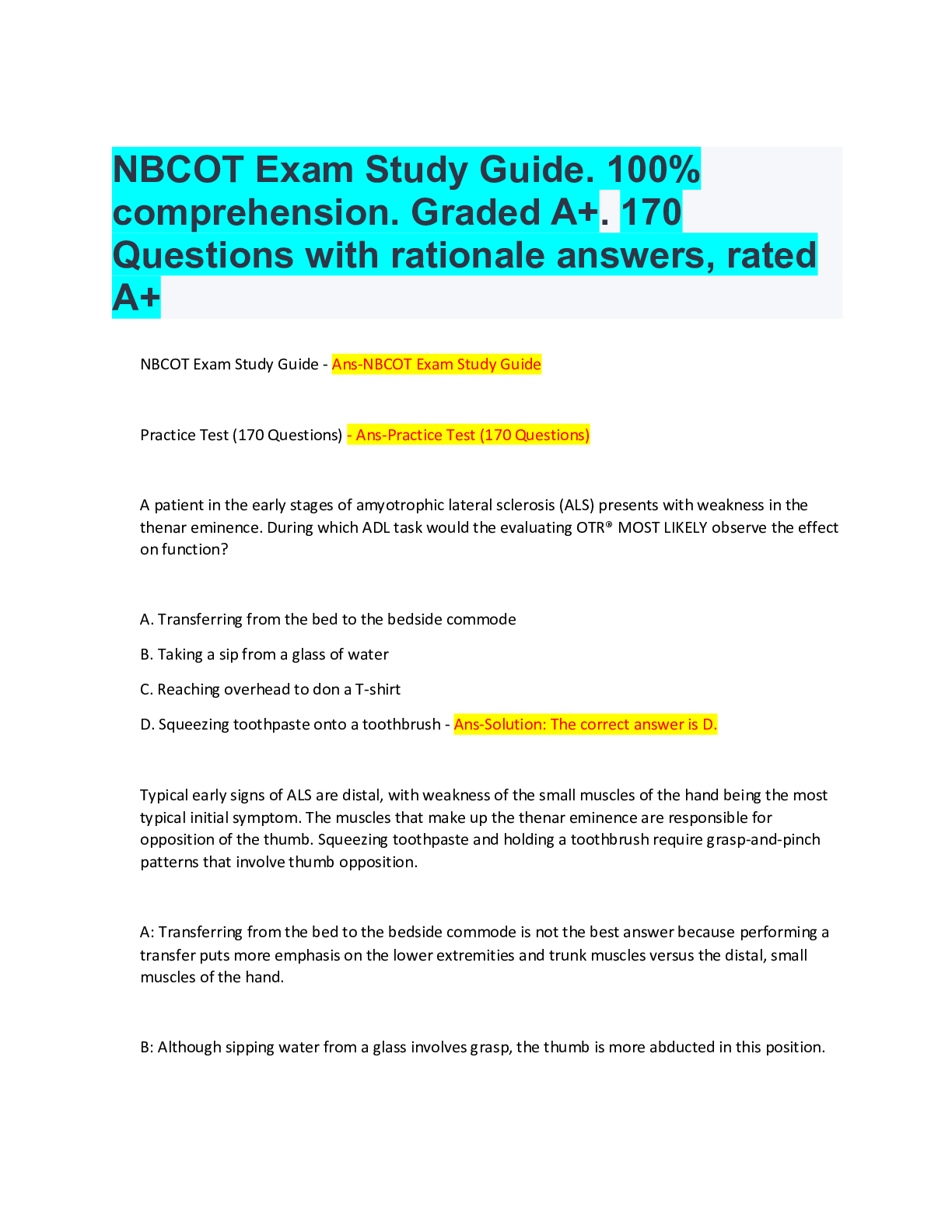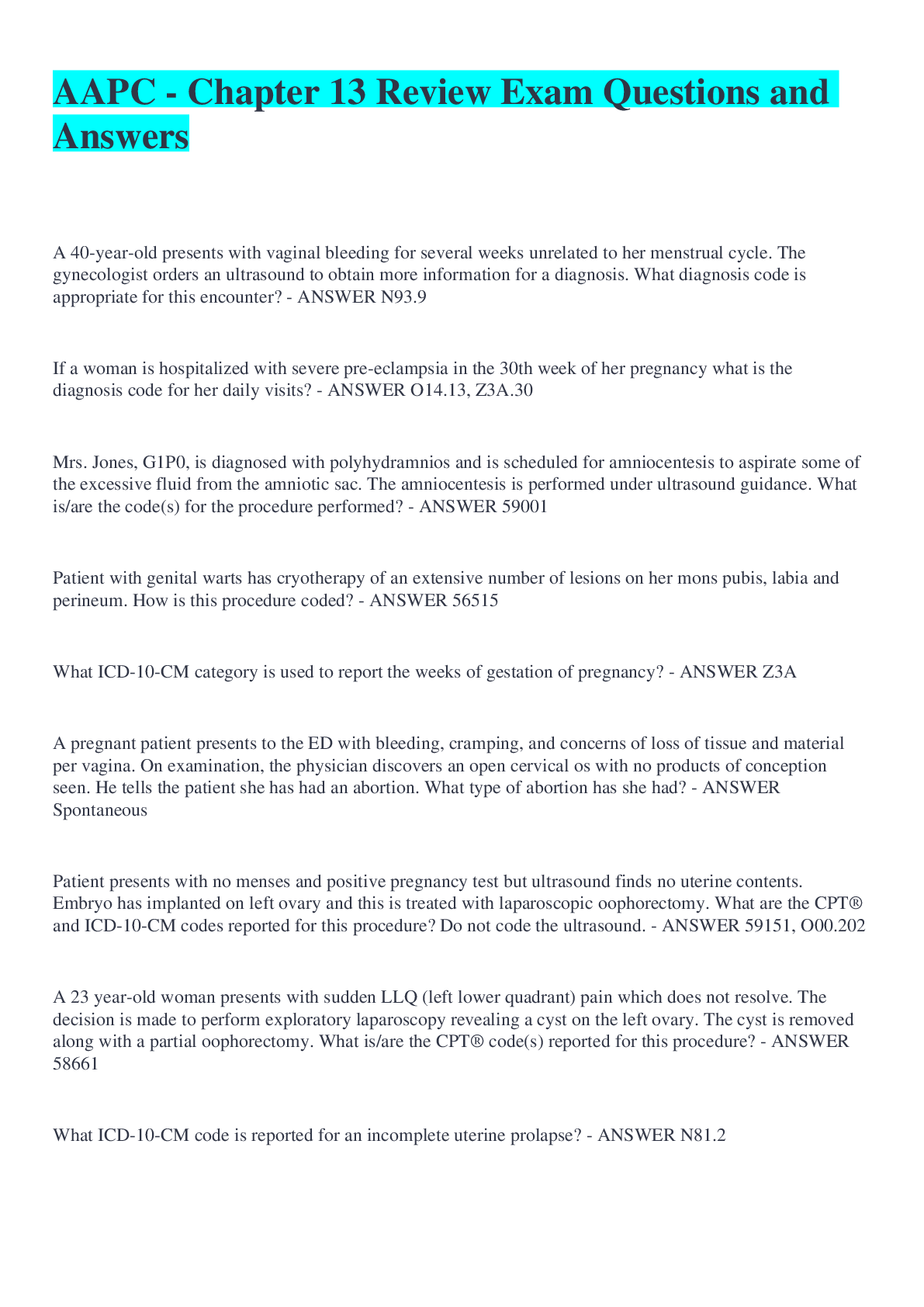Counseling > QUESTIONS & ANSWERS > NCE: Research and Program Evaluation. Pilot Study preparation, questions & Answers, rated A+ (All)
NCE: Research and Program Evaluation. Pilot Study preparation, questions & Answers, rated A+
Document Content and Description Below
NCE: Research and Program Evaluation. Pilot Study preparation, questions & Answers, rated A+ Research - ✔✔-systematic process of collecting and analyzing data for some purpose such as invest... igating a problem or answering a question Evidence-based inquiry - ✔✔-search for knowledge using empirical data which has been gathered systematically Inductive Research - ✔✔-this research begins at the real world, practical level. It tends to be descriptive, correlational, or historical and leads to the building of theory. Deductive Research - ✔✔-this research springs from theory which is already established. This research tries to determine what the relationships are between elements of the theory and may be experimental in nature. Survey - ✔✔-this non-experimental design may occur through questionnaires, interviews, etc. and is used to measure attitudes, perceptions, etc. Descriptive - ✔✔-this research simply describes an existing state of events. Numbers may be used to characterize groups or individuals Comparative - ✔✔-this research method investigates whether there are differences between two or more groups. There is no manipulation of conditions experienced by each group Correlational - ✔✔-this research method uses the correlation coefficient to determine the degree of relationship between two or more variables or phenomena. Ex Post Facto - ✔✔-Also called causal-comparative, this research design studies possible causal relationships among variables after the fact True Experiment - ✔✔-This research is characterized by the use of experimental and control groups with random assignment to each. Quasi-Experiment - ✔✔-This research is similar to experimental research except that randomization of subjects to treatment and control groups is not possible. It may be that no control or comparison group is available Qualitative - ✔✔-Research type that emphasizes gathering data about naturally occurring phenomena (individual's and groups' living experiences) and events. Data collection may be in terms of words rather than numbers. Mixed-method research designs - ✔✔-These designs combine quantitative and qualitative methods in the same research effort. The researcher retains the flexibility to use both types of designs. Typically, the designs are used sequentially. Single-subject design - ✔✔-research design that studies the effects of a program or treatment on an individual or group treated as an individual, usually after a baseline has been established Action Research - ✔✔-research conducted in an attempt to improve services or a program. This research may often be viewed as having an evaluative function Pilot Study - ✔✔-a small-scale research effort often used to determine the feasibility of a large scale effort with emphasis on refining procedures and instrumentation Longitudinal Research - ✔✔-consists of collecting data from the same group of individuals over a period of time. This is also called a panel study Cross-sectional research - ✔✔-consists of collecting data from different groups at the same time and examining these differences. Meta-analysis - ✔✔-research comparing findings across studies, i.e., the results of many studies are examined simultaneously and one or more research questions answered Internal Validity - ✔✔-validity determined by the extent to which extraneous variables have been controlled. Instrumentation - ✔✔-differences in results between two or more groups may be due to instruments which are unreliable or because the instruments are changed during the study Maturation - ✔✔-results may be due to maturational or other changes in the subjects and not due to the treatment being applied. This is especially important if research data is gathered over a long period of time Mortality or Attrition - ✔✔-losing subjects during the study could lead to different results than if everyone had stayed. Subjects with the most or least amount of important characteristics to the study may be the ones dropping out Experimenter bias - ✔✔-the responses of the subjects may be influenced by the researcher. This may occur by treating some subjects differently, reinforcing different behaviors, as well as the presence of many other variables which deliberately or unintentionally influence subjects Statistical regression - ✔✔-sometimes subjects in a study are recruited because of extreme high or low scores (e.g., self-esteem, social skills) on the dependent variable being measured External Validity - ✔✔-validity determined by the extent to which the results may be generalized to people and situations beyond the study Ecological validity - ✔✔-if the results can be generalized from one setting or circumstance to another Hawthorne Effect - ✔✔-refers to the influence in performance which occurs when subjects receive attention or know they are participating in research Demand Characteristics - ✔✔-these are all the cues, information, knowledge, and even rumors the subject has heard about the experiment, which are likely to influence his/her performance Rosenthal Effect - ✔✔-these are the changes in the subject's behavior brought about by the researcher's expectations, behaviors or attitudes. Self-fulfilling expectation of doing well because it is expected [Show More]
Last updated: 2 years ago
Preview 1 out of 14 pages

Buy this document to get the full access instantly
Instant Download Access after purchase
Buy NowInstant download
We Accept:

Reviews( 0 )
$9.00
Can't find what you want? Try our AI powered Search
Document information
Connected school, study & course
About the document
Uploaded On
Mar 12, 2023
Number of pages
14
Written in
Additional information
This document has been written for:
Uploaded
Mar 12, 2023
Downloads
0
Views
104




















